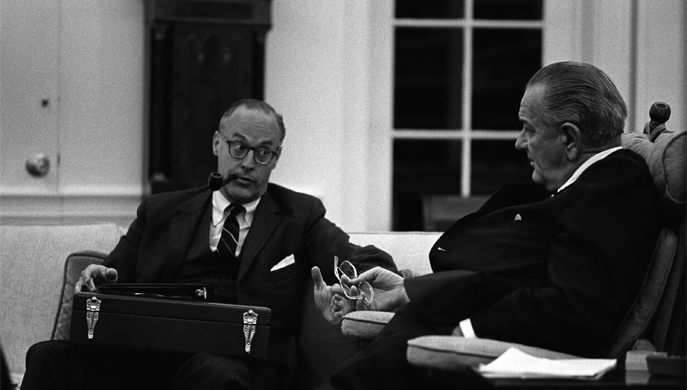
Record date:
Frank Leith Jones: Blowtorch
Blowtorch: Robert Komer, Vietnam, and American Cold War Strategy by Frank Leith Jones, is the first biography ever written about the Cold War national security policy and strategy adviser to three presidents
History has not been kind to Robert Komer. As a Cold War national security policy and strategy adviser to three presidents, Komer was one of the most influential national security professionals of the era. However, he has been a casualty of bad historical analysis and inaccurate information. His influence as a National Security Council staff member during the Kennedy administrations shaped aggressive American foreign policies. This, in turn, defined U.S. relations with then–Third World countries that served as frequent battlegrounds between communism and capitalism. Upon Kennedy’s death, Lyndon Johnson named Komer his “point man” for Vietnam pacification policy, becoming the architect of the military’s Civil Operations and Revolutionary Development Support (CORDS) program, and later, General Westmoreland’s operational deputy for this effort in Vietnam.
Blowtorch, the first biography ever written about Komer, highlights his activities during the three years he strove to fulfill the president’s vision that communism could be repelled from Southeast Asia by economic and social development, along with military force. Known as “Blowtorch” for his abrasive personality and disdain for bureaucratic foot dragging, Komer came to be seen as the right person for managing that effort, and in 1968 he was rewarded with an ambassadorship to Turkey. The book analyzes Komer’s work during the Carter administration as special adviser to Secretary of Defense Harold Brown and as Under Secretary of Defense for Policy and credits him with reenergizing the North Atlantic Treaty Organization’s conventional capability and forging the military instrument that implemented the Carter Doctrine in the Persian Gulf—the Rapid Deployment Joint Task Force. It also explores his final role as a defense intellectual and critic of the Reagan administration’s defense policies. The book concludes with a useful summary of Komer’s impact on American policy and strategy and his contributions to counterinsurgency practices, a legacy now recognized for its importance in the wars in Iraq and Afghanistan.
Frank Leith Jones is professor of security studies at the U.S. Army War College, where he holds the General Dwight D. Eisenhower Chair of National Security. A retired member of the Senior Executive Service, he served in several high-level policy and strategy positions in the Office of the Secretary of Defense and is the recipient of several civilian awards. He lives in Carlisle, Pennsylvania.










